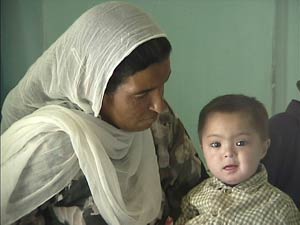International collaboration improves screening and care for mentally retarded
June 2010 | Volume 9, Issue 3
Pakistan has one of the highest reported rates of childhood mental retardation in the world. As many as 65 in every 1,000 children have mild to severe impairment. In the past few years, researchers have developed culturally-appropriate mental health interventions - sustainable in this low-resource setting - that include screening, education to reduce stigma, stress management for caregivers and community resources.
An international collaboration led by Dr. Ilyas Mirza first assessed and researched the needs, existing resources in the health care system and barriers to care for these children and their families. Mirza and his colleagues then developed a screening tool and programs that address challenging behavior, nutrition, intellectual stimulation and support groups for mothers.

Photo courtesy of the Human Development
Research Foundation
Fogarty-supported researchers are developing tools
local health workers can use to screen Pakistani
children for intellectual impairment.
“We hope to improve the quality of life of children with mental retardation and reduce the caregivers’ burden,” says Mirza, who is on staff at the Institute of Psychiatry in Rawalpindi. He also serves on the advisory board of the Human Development Research Foundation in Islamabad, which received funding for this work from Fogarty’s Brain Disorders in the Developing World program.
The researchers found that because children do not get routine medical checkups, it is not uncommon for three to four years to pass between initial concerns about a child and presentation to a health care provider. In this culture, taking a child to a medical appointment is no simple errand. Women need a chaperone, and that can be difficult since it often results in a man’s lost earnings.
Another obstacle is the lack of awareness that effective interventions for mental disabilities exist. Some parents blame themselves, poverty or spiritual forces - both positive and negative - for their child’s impairment.
“The doctors at the hospital said that the girl was all right,” said the mother of a toddler with mental retardation. “We never went to a doctor after that. I took her to a spiritual healer. I have faith in Allah.”
Stigma keeps these children and their families from participating in community life and at home, children with mental retardation are strictly supervised and often physically restrained. Caregivers are stressed and ashamed.
To achieve earlier detection of mental retardation, the researchers tested a ten-question screen for developmental disabilities on almost 1,800 children in a section of Rawalpindi. They coordinated their efforts with the Lady Health Workers, a program that is the front line of primary care for women and children in Pakistan. The group’s 100,000 members - one for every 1,000 Pakistanis - are trained to provide preventive maternal and child care and education. They found it easy to incorporate the questionnaire into their day-to-day practice.
Mirza and his co-investigators, Dr. Amina Tareen, a colleague at the Human Development Research Foundation, and Dr. Atif Rahman of the University of Liverpool, published their findings in the Journal of Intellectual Disability Research. They have raised awareness by discussing child mental health on television and conducting workshops for 150 school teachers.
At Pakistan’s leading training institution in mental health, the Institute of Psychiatry in Rawalpindi, they helped establish a department of child and adolescent psychiatry. The team is also training researchers at the Human Development Research Foundation.
With additional support, Mirza and his team would like to expand their study of the screening tool across the country and then implement the interventions that are determined to be the most effective. “Given the high level of intellectual disabilities in Pakistan, there is an urgent need for rigorous testing of interventions,” says Mirza. “It is critical that these work in low-income settings and are compatible with our existing health care system.”
More Information
To view Adobe PDF files,
download current, free accessible plug-ins from Adobe's website.